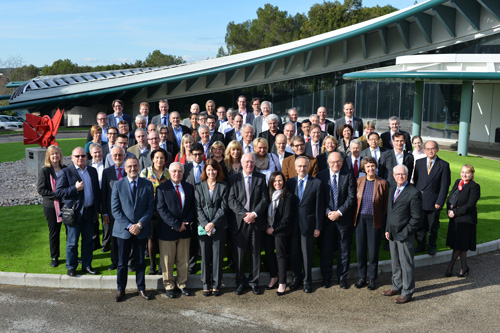Understanding and eliminating inequalities and barriers that prevent optimal treatment of atrial fibrillation
22. - 23. Januar 2015, European Heart House, Sophia Antipolis, Frankreich
Wissenschaftliche Leitung
Günter Breithardt (Münster, Deutschland)
John Camm (London, UK)
Paulus Kirchhof (Birmingham, UK / Münster, Deutschland)
Gregory Lip (Birmingham, UK)
Große Beobachtungsstudien und wissenschaftsinitiierte Register haben in den vergangenen Jahren beachtliche Unterschiede in der Behandlung von Vorhofflimmerpatienten aufgezeigt. Ziel der 5. AFNET/EHRA Konsensuskonferenz war es, Barrieren, die eine optimale Behandlung von Vorhofflimmerpatienten verhindern, zu identifizieren, die Notwendigkeit einer besseren Behandlung von Vorhofflimmern in unterschiedlichen Teilen der Welt zu begründen und eine Vision für die zukünftige Behandlung von Vorhofflimmern zu entwickeln.
Über 70 Vorhofflimmerspezialisten – eingeladene Wissenschaftler aus 16 europäischen Ländern, den USA, China und Australien, sowie Industrievertreter aus 11 Firmen – haben an der 5. AFNET/EHRA Konsensuskonferenz teilgenommen. Das zweitägige Expertentreffen startete mit Plenarvorträgen. Anschließend teilten sich die Teilnehmer in sechs Kleingruppen auf, die im Rahmen von Workshops spezielle Fragestellungen bearbeiteten. Die Resultate dieser Workshops wurden anschließend im Plenum diskutiert, um einen Konsens über die wesentlichen Ergebnisse der Konferenz zu erzielen. Diese werden in den kommenden Wochen in einem Konsensusbericht publiziert.

Gruppenfoto der Teilnehmer
Plenarvorträge
Cardiovascular complications in atrial fibrillation
- Finding atrial fibrillation – just keep looking, just keep looking... with new technologies! (Ben Freedman, Sydney, AU)
- The need to fully implement existing (proven) therapies in AF patients
European perspective (Gregory Lip, Birmingham, GB)
Pan-American perspective (Jonathan Piccini, Durham, US)
Asian-Pacific Perspective (Hung Fat Tse, Hong Kong HK) - The need for further improvement of atrial fibrillation management (Paulus Kirchhof, Birmingham, UK)
New drugs in AF: real-life questions and experiences
- NOACs in clinical practice: Updated answers from a professional organization (Hein Heidbuchel, Leuven, BE)
- New antiarrhythmic drugs: Fit to match clinical needs? (John Camm, London, GB)
- Predicting and avoiding bleeding events in patients treated with non-vitamin K antagonist medications (Jonas Oldgren, Uppsala, SE)
- Patient preferences and patient-reported outcomes: A view from the ESC (Melanie Calvert, Birmingham, GB)
Drugs and interventious – the future is integrated!
- Challenges on the main road – ensuring quality of AF ablation procedures (Gerd Hindricks, Leipzig, DE)
- Combination of antiarrhythmic drugs and catheter ablation (Harry Crijns, Maastricht, NL)
- Should we combine left atrial appendage occluders with oral anticoagulants in selected patients? (Thorsten Lewalter, Munich, DE)
Novel health modifiers and therapeutic targets in AF
- Extracting biomarkers through bioinformatics (Monika Stoll, Münster, DE)
- Validation of biomarkers for AF: Incident AF, AF recurrence and AF related complications (Renate Schnabel, Hamburg, DE)
- ECG-based markers to guide rhythm control therapy (Ulrich Schotten, Maastricht, NL)
- Translating risk factors into disease mechanisms: Obesity (Stephane Hatem, Paris, FR)
- Adding a third dimension to genomic analysis and SNPs in AF (Patrick Ellinor, Boston, US)
- Making sense of genetic markers in AF – an update on pitx2 (Larissa Fabritz, Birmingham, GB)
Themen der Workshops
Workshop 1: Enabling evidence-based AF management: What can we learn from our neighbours?
Workshop 2: Patient empowerment and patient involvement in AF care
Workshop 3: Hybrid rhythm control therapy – a safe way to enhance maintenance of sinus rhythm?
Workshop 4: How common is “polygenic AF”, and what are the possible management implications?
Workshop 5: Optimal stroke prevention in AF – where do we go beyond existing guidelines?
Workshop 6: Biomarkers to guide AF management (in blood and ECG).
Finanzierung
Die Veranstaltung wurde von AFNET und EHRA gemeinsam finanziert und erhielt zusätzliche finanzielle Unterstützung von Bayer, Boehringer Ingelheim, Boston Scientific, Bristol-Myers Squibb, Cardiome, Daiichi Sankyo, Meda Pharma, Medtronic, Pfizer, Roche, VTT.
Publikation
Kirchhof P, Breithardt G, Bax J, Benninger G, Blomstrom-Lundqvist C, Boriani G, Brandes A, Brown H, Brueckmann M, Calkins H, Calvert M, Christoffels V, Crijns H, Dobrev D, Ellinor P, Fabritz L, Fetsch T, Freedman SB, Gerth A, Goette A, Guasch E, Hack G, Haegeli L, Hatem S, Haeusler KG, Heidbüchel H, Heinrich-Nols J, Hidden-Lucet F, Hindricks G, Juul-Möller S, Kääb S, Kappenberger L, Kespohl S, Kotecha D, Lane DA, Leute A, Lewalter T, Meyer R, Mont L, Münzel F, Nabauer M, Nielsen JC, Oeff M, Oldgren J, Oto A, Piccini JP, Pilmeyer A, Potpara T, Ravens U, Reinecke H, Rostock T, Rustige J, Savelieva I, Schnabel R, Schotten U, Schwichtenberg L, Sinner MF, Steinbeck G, Stoll M, Tavazzi L, Themistoclakis S, Tse HF, Van Gelder IC, Vardas PE, Varpula T, Vincent A, Werring D, Willems S, Ziegler A, Lip GYH, Camm AJ. A roadmap to improve the quality of atrial fibrillation management: proceedings from the fifth Atrial Fibrillation Network/European Heart Rhythm Association consensus conference. Europace 2016 Jan 1; 18 (1):37-50 doi: 10.1093/europace/euv304 . Epub 2015 Oct 18.
